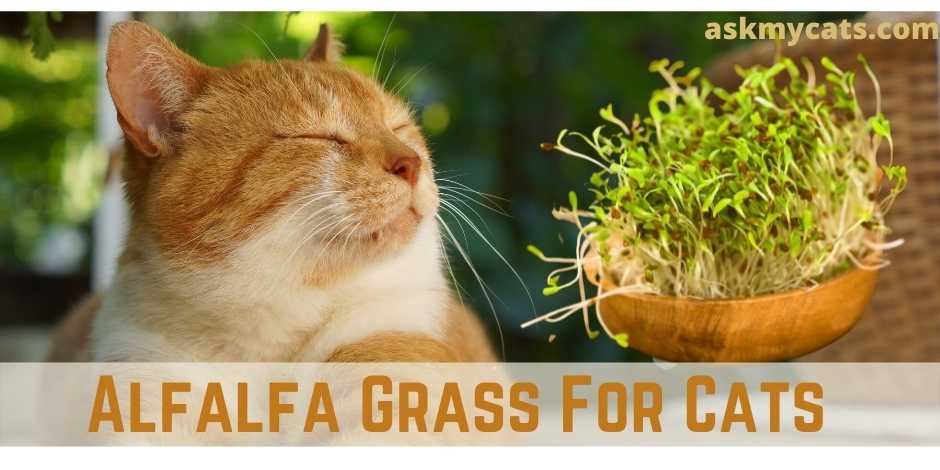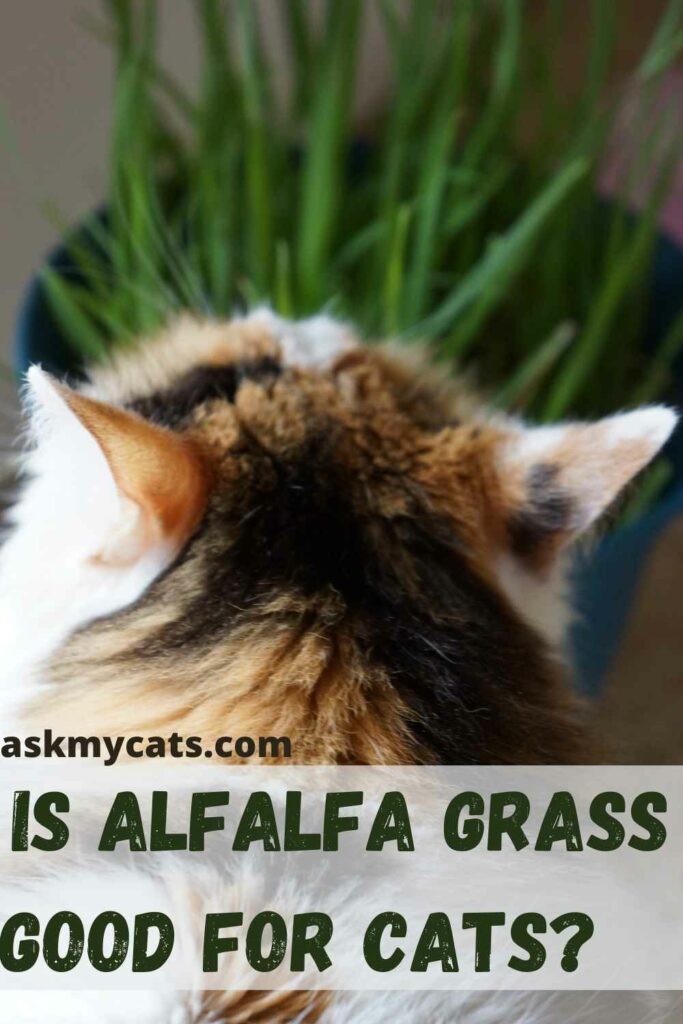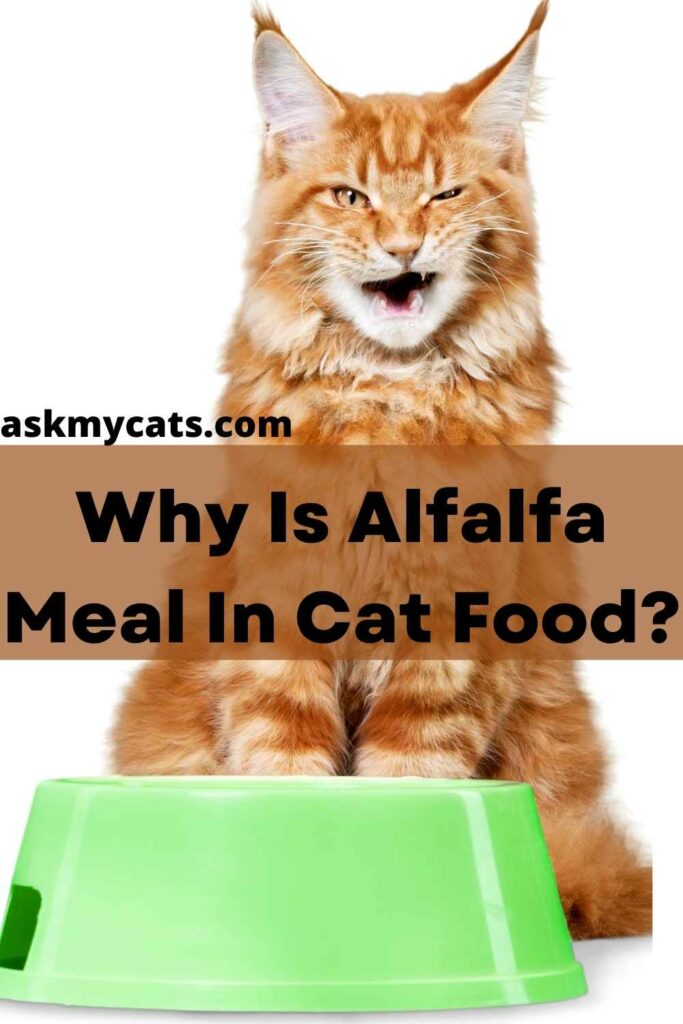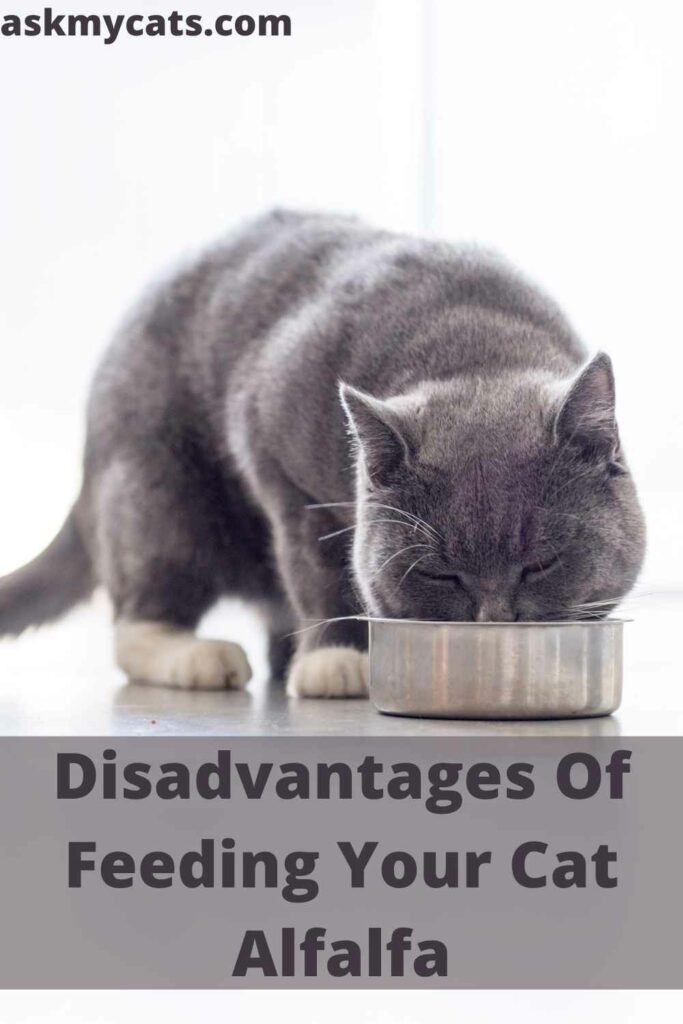Despite the fact that cats are carnivores, many of them like nibbling on plants or grass. Cats, on the other hand, do not necessarily always benefit from eating grass and plant stuff. Some houseplants and flowers are poisonous to cats, and lawn grass can contain harmful fertilizers, insecticides, and weed killers.
Fortunately, there is a safe substitute: Alfalfa grass.
Alfalfa grass, sometimes known as kitty grass, is a particular cat-safe grass that can be given to your indoor cat as a treat or snack. Alfalfa grass can be purchased already grown, or you can purchase kits that include trays or bags of seeds that you can water and sprout in the container yourself.
This article will talk about is alfalfa grass safe for cats and the benefits of alfalfa grass.


Give Your Cat the Perfect Day
Get the Free Ebook!
What Is Alfalfa?
Alfalfa is a perennial flowering plant in the pea family that looks similar to clover and has clusters of small purple flowers.
In the United Kingdom, Australia, South Africa, New Zealand, and other parts of the world, alfalfa (Medicago sativa) is known as lucerne.
Alfalfa is a warm-climate plant that is widely farmed as a feed crop in many countries. The plant’s above-ground sections are chopped, dried in a natural gas furnace, and pelleted; alternatively, the plant can be cut, sun-dried, and baled for future feeding.
During the summer, alfalfa grows continually and produces three to five cuttings per year.
In terms of nutrition, air-dried alfalfa includes between 14 and 22 percent protein, 10% ash, less than 5% crude fat, and 15 to 30% crude fiber.
The majority of the fiber is insoluble. Alfalfa contains calcium, potassium, and other trace minerals, as well as beta-carotene, vitamin K, and a number of B vitamins.
The plant also includes chlorophyll, and its leaves contain saponins and phytoestrogens, among other beneficial chemicals.
Can Cats Eat Alfalfa Grass?
Yes, cats can eat alfalfa grass.
Alfalfa grass, not to be mistaken with the grass on your lawn, which could be contaminated with hazardous chemicals. Alfalfa grass is a type of grass that is grown specifically for pets in the home.
A delightful, devoted cat food might distract your cat from other potentially dangerous or sensitive plants. An alfalfa grass garden is an ideal technique to deter your cat from chewing on or tipping over your houseplants.
It’s also crucial to keep your cat garden apart from the rest of your houseplants.
A detailed list of common home plants that are harmful or irritating to cats and dogs is provided by the American Society for the Prevention of Cruelty to Animals.
Keep philodendrons, aloe, parsley, and other dangerous plants on a high shelf or in a hanging pot where she can’t reach them, and keep your Alfalfa grass low to the ground where she can see it.
Do Cats Like Alfalfa Sprouts?
Whether your will cat likes alfalfa sprouts is completely dependent upon its personality and taste.
Cats can eat alfalfa sprouts, but whether they like the taste or not is a personal preference.
Neither the list of popular meals that cats detest nor the list of popular foods that cats prefer includes alfalfa sprouts.
This can be discovered by eating alfalfa sprouts. Check to see whether your cat is purring and walking around while you’re eating. If you answered yes, your cat enjoys the flavor of alfalfa sprouts.
Is Alfalfa Grass Good For Cats?

Yes, alfalfa grass is good for cats as it is known to cure several kidney diseases in cats.
Alfalfa grass is extremely beneficial to cats suffering from kidney illness.
Alfalfa not only treats but also helps to avoid renal disease. If your cat comes from a lineage that has a history of renal problems, alfalfa grass is the best sort of cat grass to plant.
The capacity of alfalfa to decrease cholesterol is its most well-studied health benefit to date.
It has been demonstrated in numerous animal experiments to lower total cholesterol, LDL (bad) cholesterol, and triglyceride levels while boosting HDL (good) cholesterol, potentially lowering the risk of heart disease.
The high amount of saponins in alfalfa is thought to be responsible for its cholesterol-lowering properties. Saponins are plant chemicals that are known to decrease cholesterol levels.
They achieve this by reducing cholesterol absorption in the intestines and boosting the excretion of chemicals that are utilized to make new cholesterol.
There is a vast range of traditional therapeutic uses for alfalfa. Lowering blood pressure, acting as a diuretic, improving breast milk production, alleviating arthritis, and removing kidney stones are just a few of the benefits.
The majority of these alleged health benefits have yet to be investigated. A number of them, however, have been examined to some extent.
Alfalfa has long been used as an antidiabetic, or blood sugar-lowering medication.
Alfalfa appears to promote cardiometabolic health by lowering blood fat and blood sugar levels, according to several animal studies.
Also, check out details about cat grass vs catnip
Why Is Alfalfa Meal In Cat Food?
Alfalfa meal is present in cat food because of its high nutrient content.

Alfalfa Nutrient Concentrate is a high-quality phytonutrient supplement and protein source that helps to nourish the digestive, skeletal, glandular, and urinary systems.
So, what is an alfalfa meal in cat food, exactly?
The majority of the alfalfa meal you give your cat is the aerial portion of the alfalfa plant, which has been sun-cured and finely ground and is relatively free of other agricultural plants, weeds, and mold. Antioxidants and vitamins abound.
Alfalfa is a nutrient-dense herb, meaning it contains a lot of “good things” in a tiny amount.
Alfalfa is a ‘deep root’ plant, which means it can reach deep into the soil to collect minerals and other nutrients, which end up in the plant leaves.
Proteins, chlorophyll, fiber, vitamins A, C, D, K, and B vitamins, as well as minerals including calcium, potassium, zinc, and manganese, are all abundant in alfalfa.
Cats are unable to digest plants and seeds very well, thus they don’t eat a lot of herbs and grasses like alfalfa. Alfalfa is commonly eaten by herbivores. Cats and other hunters have evolved to acquire their “greens” from their prey’s digestive tracts.
Nutrients present in alfalfa meal in cat food are: –
- Calcium
- Protein
- Magnesium
- Potassium
- Zinc
- Iron
- Phosphorus
- Vitamins A, B1, B6, B12, C, D, E, and K
- Chlorophyll A and B
- Fiber
- Antioxidants
- Digestive enzymes
- Amino acids
- Isoflavones
- Saponins
- Sterols
- Coumarin derivatives
Nature rarely packs so much nourishment into a single food or material. It’s no surprise that many people enjoy providing it to their cats for a variety of reasons.
These nutrients are given in the balance determined by nature when alfalfa is the source. As a result, the nutrients are absorbed with their utmost efficiency.
You might also like to know the difference between cat grass vs wheatgrass
Is Alfalfa Meal Safe For Cats?
Yes, alfalfa meal is safe for cats is fed in moderation, and also packs many benefits like: –
All cats require heart health, and alfalfa supplements are given to them in the hopes of decreasing cholesterol and preventing artery plaque accumulation.
In a cat’s urinary tract, acidic urine can cause “stones” to form. Because alfalfa’s alkalizing impact can assist reduce urine acidity, cat owners offer it to their cats in the hopes of reducing their pain.
If left untreated, constipation can be fatal to your cat. If a cat owner notices that their cat is in pain, they can give them alfalfa supplements.
The anti-inflammatory benefits of alfalfa come from natural steroidal compounds contained in the plant. Alfalfa supplements are frequently given to cats suffering from inflammation caused by arthritis, injury, or other diseases.
One of the main reasons people give their cats alfalfa nutrients is to improve their immune function.
Another reason people offer alfalfa to their cats is to prevent cancer. Chemical carcinogens may be rendered inactive by certain substances.
Treatment for Bleeding Disorder. Vitamin K, together with its coumarin component, is well known for its anticoagulant properties, and alfalfa contains a lot of both.
Cat odors are one of the few drawbacks of caring for our furry companions. Because alfalfa supplements contain chlorophyll, a natural element that promotes freshness and lowers pet odors, cat owners frequently use them when they want a cleaner environment for their cats.
Also, check out Can Cats Eat Barley
Disadvantages Of Feeding Your Cat Alfalfa
Some disadvantages of feeding your cat alfalfa are: –

- While alfalfa is abundant in protein, plant-based proteins lack all of the amino acids that your carnivorous cat demands. The protein in animal tissue provides a complete amino acid profile, which is why cats require meat-based nutrition.
- Alfalfa, like soy, includes phytoestrogens, which are plant estrogens that have been linked to endocrine disruption.
- Saponins, which are glycosides with a foaming property, are found in alfalfa. Saponins are anti-nutrients, which means they prevent vital nutrients from being absorbed.
The bottom line is that instead of plant-based feed more suitable for livestock, you may provide your cat with the protein contained in alfalfa by offering optimally nutritious, species-appropriate foods.
With that stated, there are few high-quality raw and dehydrated pet foods (as well as numerous supplements) that contain extremely small amounts of alfalfa.
These companies are utilizing the full food elements contained in this plant rather than using it as a protein substitute.
There’s no need to be concerned if you’re utilizing alfalfa as a phytonutrient supplement in small amounts.
If you’re feeding a high-quality commercial cat food and your cat is doing well, experts say you shouldn’t be concerned about alfalfa as an ingredient as long as it’s not in the top half of the ingredient list.
These businesses aren’t attempting to replace meat protein with plant-based protein. If you want further information, you can contact the manufacturer to find out how much alfalfa is in the food you’re giving your cat and to discuss any issues you have.
Check out more details about Can Cats Eat Wheatgrass? Is Wheatgrass Good For Cats?
Frequently Asked Questions
Are cats allergic to alfalfa?
Most cats are not allergic to alfalfa. However, if you notice any signs of illness in your cat after consuming alfalfa contact your vet immediately.
Where can I buy alfalfa nutrient concentrate for my cat?
There are several sources available, but keep in mind that the alfalfa you purchase should be grown without the use of chemicals. Alfalfa should be grown and processed mechanically, with no chemical or other modifications. It should be GMO-free by nature. Because alfalfa solutions administered in improper volumes, concentrations, or mixtures might cause digestive and other difficulties for your cat, it’s critical to choose your alfalfa supplement source carefully.
What is a dehydrated alfalfa meal?
Dehydrated alfalfa is a meal made from alfalfa that has been dried quickly using artificial techniques. Alfalfa meal is made into pellets and used in chicken feed, cow feed, hog feed, sheep feed, turkey mash, and other formula feeds.
Can humans digest alfalfa?
It has a long history of use as a human therapeutic herb in addition to being used as feed. Its seeds or dried leaves can be supplemented, or the seeds can be grown and consumed like alfalfa sprouts.
Is alfalfa a legume?
Alfalfa, often known as lucerne and in binomial nomenclature as Medicago sativa, is a perennial flowering plant in the legume family. It is grown as a major forage crop in a number of nations throughout the world. It’s utilized as green manure and cover crop, as well as for grazing, hay, and silage.
Final Words
Alfalfa is extremely nutrient-dense. It has a rare blend of vitamins, antioxidants, and immune-boosting characteristics. It can help your cat with everything from kidney disorders and stone removal to cardiac difficulties.
However, always contact your veterinarian before giving your cat alfalfa. He’ll assist you in developing a better feeding strategy for your cat based on her needs.
If you have any questions, ask us in the comments section.
Also, check out Oat Grass For Cats: Is Oat Grass Good For Cats?

I thought alfalfa has a high oxalate content which contributes to kidney stones? I don’t understand how it can help with kidney disease? There’s this brand of kibbles for cats. Sun cured alfalfa meal is the 11th ingredient. It’s still in the top half of the ingredient list. Do you think it’s a concern? Thanks.
Hi there,
Thanks for your question. I understand your concern about alfalfa and kidney disease. Alfalfa does have a high oxalate content, which can contribute to kidney stones. However, it also has other nutrients that can be beneficial for cats with kidney disease, such as protein, fiber, and vitamins A and K.
The amount of alfalfa in the kibbles you mentioned is relatively low, so it’s probably not a major concern. However, it’s always a good idea to talk to your veterinarian about the best diet for your cat’s specific needs. They can help you assess the risk of kidney stones and make sure your cat is getting the nutrients they need.
Here are some additional things to keep in mind about alfalfa and kidney disease in cats:
If you are concerned about your cat’s risk of kidney stones, talk to your veterinarian about a diet that is low in oxalate and other potential kidney stone triggers. They can also help you make sure your cat is getting enough fluids.
I hope this helps!